Abstract
The pattern of behaviors and abilities that reflect the core characteristics of students with autism spectrum disorder (ASD) and an environment that lacks the ability to understand individuals with ASD can make these students targets of bullying. Bullying is a serious problem for students with ASD, and practices against it are important in terms of improving students' coping strategies and overall well-being. In this study, we used a multiple probe model with an interprobe phase across participants to evaluate the effectiveness of the power card strategy to teach three students with ASD to respond to bullying. At baseline, the students gave few appropriate responses based on coping strategies for bullying after listening to stories about bullying. During the application of the power cards, the students read scenarios and power cards created for their favorite heroes or special interests, which included coping strategies for three different bullying situations (exclusion, being pushed, and being tickled). Then, they watched animations prepared for these bullying situations and were asked to answer questions about strategies to deal with bullying. The findings showed that all three students learned targeted strategies for coping with bullying in the context of the sessions using power cards. The students were able to generalize to different bullying situations (teasing, damaging one's belongings, being ignored) while retaining their strategies for coping with bullying in the context of the sessions held after the teaching was completed. The social validity findings of the power card strategy showed that one out of three students exhibited coping strategies for bullying in the school environment. The findings of the present study are discussed in the context of bullying and ASD, limitations, and recommendations.





Similar content being viewed by others
Data Availability
In the study, attention was paid to data availability.
Code Availability
In the study, attention was paid to code availability.
References
Altomare, A. A., McCrimmon, A. W., Cappadocia, M. C., Weiss, J. A., Beran, T. N., & Smith-Demers, A. D. (2017). When push comes to shove: How are students with autism spectrum disorder coping with bullying? Canadian Journal of School Psychology, 32(3–4), 209–227. https://doi.org/10.1177/0829573516683068
American Psychiatric Association. (2013). Diagnostic and statistical manual of mental disorders. American Psychiatric Publishing.
Angell, M. E., Nicholson, J. K., Watts, E. H., & Blum, C. (2011). Using a multicomponent adapted power card strategy to decrease latency during interactivity transitions for three children with developmental disabilities. Focus on Autism and Other Developmental Disabilities, 26(4), 206–217. https://doi.org/10.1177/1088357611421169
Arora, C. M. J. (1996). Defining bullying: Towards a clearer general understanding and more effective intervention strategies. School Psychology International, 17(4), 317–329. https://doi.org/10.1177/0143034396174002
Astington, J. W., & Barriault, T. (2001). Children’s theory of mind: How young children come to understand that people have thoughts and feelings. Infants & Young Children, 13(3), 1–12. https://doi.org/10.1097/00001163-200113030-00005
Attwood, T. (2004). Strategies to reduce the bullying of young children with Asperger syndrome. Australasian Journal of Early Childhood, 29(3), 15–23. https://doi.org/10.1177/183693910402900304
Atwood, T. (2007). The complete guide to asperger’s syndrome. Jessica Kingsley Publishers.
Baron, M. G., Lipsitt, L. P., & Goodwin, M. S. (2006). Scientific foundations for research and practice. In M. G. Baron, J. Groden, G. Groden, & L. P. Lipsitt (Eds.), Stress and coping in autism (pp. 42–67). Oxford University Press.
Bauminger, N., Shulman, C., & Agam, G. (2003). Peer interaction and loneliness in high-functioning children with autism. Journal of Autism and Developmental Disorders, 33(5), 489–507. https://doi.org/10.1023/a:1025827427901
Bernstein, J. Y., & Watson, M. W. (1997). Children who are targets of bullying: A victim pattern. Journal of Interpersonal Violence, 12(4), 483–498. https://doi.org/10.1177/088626097012004001
Bitsika, V., & Sharpley, C. F. (2014). Understanding, experiences, and reactions to bullying experiences in boys with an autism spectrum disorder. Journal of Developmental and Physical Disabilities, 26(6), 747–761. https://doi.org/10.1007/s10882-014-9393-1
Blacher, J., & Lauderdale, S. (2008). Don’t laugh at me, dont call me names. The Exceptional Parents, 38(8), 62–64.
Bond, L., Carlin, J. B., Thomas, L., Rubin, K., & Patton, G. (2001). Does bullying cause emotional problems? A prospective study of young teenagers. BMJ, 323(7311), 480–484. https://doi.org/10.1136/bmj.323.7311.480
Braun, V., & Clarke, V. (2006). Using thematic analysis in psychology. Qualitative Research in Psychology, 3(2), 77–101. https://doi.org/10.1191/1478088706qp063oa
Campbell, A., & Tincani, M. (2011). The power card strategy: Strength-based intervention to increase direction following of children with autism spectrum disorder. Journal of Positive Behavior Interventions, 13(4), 240–249. https://doi.org/10.1177/1098300711400608
Campbell, J. M., Ferguson, J. E., Herzinger, C. V., Jackson, J. N., & Marino, C. A. (2004). Combined descriptive and explanatory information improves peers’ perceptions of autism. Research in Developmental Disabilities, 25(4), 321–339. https://doi.org/10.1016/j.ridd.2004.01.005
Cappadocia, M. C., Weiss, J. A., & Pepler, D. (2012). Bullying experiences among children and youth with autism spectrum disorders. Journal of Autism and Developmental Disorders, 42(2), 266–277. https://doi.org/10.1007/s10803-011-1241-x
Card, N. A., & Hodges, E. V. E. (2008). Peer victimization among schoolchildren: Correlations, causes, consequences, and considerations in assessment and intervention. School Psychology Quarterly, 23(4), 451–461. https://doi.org/10.1037/a0012769
Carter, S. (2009). Bullying of students with Asperger syndrome. Issues in Comprehensive Pediatric Nursing, 32(3), 145–154. https://doi.org/10.1080/01460860903062782
Carver, C. S., Scheier, M. F., & Weintraub, J. K. (1989). Assessing coping strategies: A theoretically based approach. Journal of Personality and Social Psychology, 56(2), 267–283. https://doi.org/10.1037//0022-3514.56.2.267
Cascio, C. J., Foss-Feig, J. H., Heacock, J., Schauder, K. B., Loring, W. A., Rogers, B. P., Pryweller, J. R., Newsom, C. R., Cockhren, J., Cao, A., & Bolton, S. (2014). Affective neural response to restricted interests in autism spectrum disorders. Journal of Child Psychology and Psychiatry, 55(2), 162–171. https://doi.org/10.1111/jcpp.12147
Causey, D. L., & Dubow, E. F. (1992). Development of a self-report coping measure for elementary school children. Journal of Clinical Child Psychology, 21(1), 47–59. https://doi.org/10.1207/s15374424jccp2101_8
Centers for Disease Control and Prevention. (2023). Autism and developmental disabilities monitoring network. Retrieved April 7, 2023, from https://www.cdc.gov/ncbddd/autism/data.html
Çifci-Tekinarslan, I., & Sucuoglu, B. (2007). Effectiveness of cognitive process approached social skills training program for people with mental retardation. International Journal of Special Education, 22(2), 7–18.
Compas, B. E., Connor-Smith, J. K., Saltzman, H., Thomsen, A. H., & Wadsworth, M. E. (2001). Coping with stress during childhood and adolescence: Problems, progress, and potential in theory and research. Psychological Bulletin, 127(1), 87–127. https://doi.org/10.1037/0033-2909.127.1.87
Cook, A., Ogden, J., & Winstone, N. (2016). The experiences of learning, friendship and bullying of boys with autism in mainstream and special settings: A qualitative study. British Journal of Special Education, 43(3), 250–271. https://doi.org/10.1111/1467-8578.12143
Craig, W. M., Pepler, D., & Atlas, R. (2000). Observations of bullying in the playground and in the classroom. School Psychology International, 21(1), 22–36. https://doi.org/10.1177/0143034300211002
Daubert, A., Hornstein, S., & Tincani, M. (2015). Effects of a modified power card strategy on turn taking and social commenting of children with autism spectrum disorder playing board games. Journal of Developmental and Physical Disabilities, 27(1), 93–110. https://doi.org/10.1007/s10882-014-9403-3
Davis, K. M., Boon, R. T., Cihak, D. F., & Fore, C. (2010). Power cards to improve conversational skills in adolescents with Asperger syndrome. Focus on Autism and Other Developmental Disabilities, 25(1), 12–22. https://doi.org/10.1177/1088357609354299
Dettmer, S., Simpson, R. L., Myles, B. S., & Ganz, J. B. (2000). The use of visual supports to facilitate transitions of students with autism. Focus on Autism and Other Developmental Disabilities, 15(3), 163–169. https://doi.org/10.1177/108835760001500307
Dichter, G. S., Felder, J. N., Green, S. R., Rittenberg, A. M., Sasson, N. J., & Bodfish, J. W. (2012). Reward circuitry function in autism spectrum disorders. Social Cognitive and Affective Neuroscience, 7(2), 160–172. https://doi.org/10.1093/scan/nsq095
Dingfelder, H. E., & Mandell, D. S. (2011). Bridging the research-to-practice gap in autism intervention: An application of diffusion of innovation theory. Journal of Autism and Developmental Disorders, 41(5), 597–609. https://doi.org/10.1007/s10803-010-1081-0
Dubin, N. (2007). Asperger syndrome and bullying: Strategies and solutions. Jessica Kingsley Publishers.
Eroglu, M., & Kilic, B. G. (2020). Peer bullying among children with autism spectrum disorder in formal education settings: Data from Turkey. Research in Autism Spectrum Disorders, 75, 101572. https://doi.org/10.1016/j.rasd.2020.101572
Farrington, D. P., & Ttofi, M. M. (2009). How to reduce school bullying. Victims & Offenders, 4(4), 321–326. https://doi.org/10.1080/15564880903227255
Fields, L., & Prinz, R. J. (1997). Coping and adjustment during childhood and adolescence. Clinical Psychology Review, 17(8), 937–976. https://doi.org/10.1016/s0272-7358(97)00033-0
Flanagan, K. S., Hoek, K. K. V., Shelton, A., Kelly, S. L., Morrison, C. M., & Young, A. M. (2013). Coping with bullying: What answers does children’s literature provide? School Psychology International, 34(6), 691–706. https://doi.org/10.1177/0143034313479691
Gagnon, E. (2001). Power cards: Using special interests to motivate children and youth with asperger syndrome and autism. AAPC Publishing.
Gagnon, E., & Myles, B. S. (2016). The power card strategy 2: Using special interests to motivate children and youth with autism spectrum disorder. AAPC Publishing.
Ghanouni, P., & Quirke, S. (2023). Resilience and coping strategies in adults with autism spectrum disorder. Journal of Autism and Developmental Disorders, 53(1), 456–467. https://doi.org/10.1007/s10803-022-05436-y
González-Calatayud, V., Roman-García, M., & Prendes-Espinosa, P. (2021). Knowledge about bullying by young adults with special educational needs with or without disabilities (SEN/D). Frontiers in Psychology, 11, 622517. https://doi.org/10.3389/fpsyg.2020.622517
Gray, C. A. (1998). Social stories and comic strip conversations with students with Asperger syndrome and high-functioning autism. In E. Schoper, G. Mesibov, & L. J. Kunce (Eds.), Asperger syndrome or high-functioning autism? (pp. 167–198). Plenum Press.
Gray, C. (2004). Gray’s guide to bullying parts I-III. Jenison Public Schools.
Guldberg, K., Parsons, S., Porayska-Pomsta, K., & Keay-Bright, W. (2017). Challenging the knowledge-transfer orthodoxy: Knowledge co-construction in technology-enhanced learning for children with autism. British Educational Research Journal, 43(2), 394–413. https://doi.org/10.1002/berj.3275
Güleç-Aslan, Y. (2022). Voice of educators: What is the perspective of educators about power card strategy? Journal of Education. https://doi.org/10.1177/00220574221076457
Gunn, K. C. M., & Delafield-Butt, J. T. (2016). Teaching children with autism spectrum disorder with restricted interests: A review of evidence for best practice. Review of Educational Research, 86(2), 408–430. https://doi.org/10.3102/0034654315604027
Hagland, C. (2010). Social rules and relationships. In C. Hagland (Ed.), Getting to grips with Asperger syndrome (pp. 115–138). Jessica Kingsley.
Halliday, S., Gregory, T., Taylor, A., Digenis, C., & Turnbull, D. (2021). The impact of bullying victimization in early adolescence on subsequent psychosocial and academic outcomes across the adolescent period: A systematic review. Journal of School Violence, 20(3), 351–373. https://doi.org/10.1080/15388220.2021.1913598
Heinrichs, R. R. (2003). A whole-school approach to pullying: Special considerations for children with exceptionalities. Intervention in School and Clinic, 38(4), 195–204. https://doi.org/10.1177/105345120303800401
Hodgins, Z., Kelley, E., Kloosterman, P., Hall, L., Hudson, C. C., Furlano, R., & Craig, W. (2020). Brief report: Do you see what I see? The perception of bullying in male adolescents with autism spectrum disorder. Journal of Autism and Developmental Disorders, 50(5), 1822–1826. https://doi.org/10.1007/s10803-018-3739-y
Hong, E. R., Neely, L., & Lund, E. M. (2015). Addressing bullying of students with autism: Suggestions for families and educators. Intervention in School and Clinic, 50(3), 157–162. https://doi.org/10.1177/1053451214542047
Horner, R. H., Carr, E. G., Halle, J., McGee, G., Odom, S., & Wolery, M. (2005). The use of single-subject research to identify evidence-based practice in special education. Exceptional Children, 71(2), 165–179. https://doi.org/10.1177/001440290507100203
Humphrey, N., & Hebron, J. (2015). Bullying of children and adolescents with autism spectrum conditions: A ‘state of the field’ review. International Journal of Inclusive Education, 19(8), 845–862. https://doi.org/10.1080/13603116.2014.981602
Humphrey, N., & Symes, W. (2010). Responses to bullying and use of social support among pupils with autism spectrum disorders (ASDs) in mainstream schools: A qualitative study. Journal of Research in Special Educational Needs, 10(2), 82–90. https://doi.org/10.1111/j.1471-3802.2010.01146.x
Hwang, Y.-S., Dillon-Wallace, J., Campbell, M., Ashburner, J., Saggers, B., Carrington, S., & Hand, K. (2018). How students with autism spectrum conditions understand traditional bullying and cyberbullying. International Journal of Inclusive Education, 22(4), 391–408. https://doi.org/10.1080/13603116.2017.1370736
Ingersoll, B., & Schreibman, L. (2006). Teaching reciprocal imitation skills to young children with autism using a naturalistic behavioral approach: Effects on language, pretend play, and joint attention. Journal of Autism and Developmental Disorders, 36(4), 487–505. https://doi.org/10.1007/s10803-006-0089-y
Kapcı, E. G. (2004). Bullying type and severity among elementary school students and its relationship with depression, anxiety and self esteem. Ankara University Journal of Faculty of Educational Sciences, 37(1), 1–13. https://doi.org/10.1501/Egifak_0000000087
Kazdin, A. E. (2011). Single-case research designs: Methods for clinical and applied settings. Oxford University Press.
Keeling, K., Myles, B. S., Gagnon, E., & Simpson, R. L. (2003). Using the power card strategy to teach sportsmanship skills to a child with autism. Focus on Autism and Other Developmental Disabilities, 18(2), 105–111. https://doi.org/10.1177/108835760301800204
Kochenderfer-Ladd, B., & Skinner, K. (2002). Children’s coping strategies: Moderators of the effects of peer victimization? Developmental Psychology, 38(2), 267–278. https://doi.org/10.1037//0012-1649.38.2.267
Koegel, L. K., Singh, A. K., & Koegel, R. L. (2010). Improving motivation for academics in children with autism. Journal of Autism and Developmental Disorders, 40(9), 1057–1066. https://doi.org/10.1007/s10803-010-0962-6
Koegel, R., Fredeen, R., Kim, S., Danial, J., Rubinstein, D., & Koegel, L. (2012). Using perseverative interests to improve interactions between adolescents with autism and their typical peers in school settings. Journal of Positive Behavior Interventions, 14(3), 133–141. https://doi.org/10.1177/1098300712437043
Koegel, R., Kim, S., Koegel, L., & Schwartzman, B. (2013). Improving socialization for high school students with ASD by using their preferred interests. Journal of Autism and Developmental Disorders, 43(9), 2121–2134. https://doi.org/10.1007/s10803-013-1765-3
Kunda, M., & Goel, A. K. (2011). Thinking in pictures as a cognitive account of autism. Journal of Autism and Developmental Disorders, 41(9), 1157–1177. https://doi.org/10.1007/s10803-010-1137-1
Lazarus, R. S. (1993). From psychological stress to the emotions: A history of changing outlooks. Annual Review of Psychology, 44, 1–21. https://doi.org/10.1146/annurev.ps.44.020193.000245
Lindorff, M. (2010). Ethics, ethical human research and human research ethics committees. The Australian Universities’ Review, 52(1), 51–59.
Little, L. (2002). Middle-class mothers’ perceptions of peer and sibling victimization among children with Asperger’s syndrome and nonverbal learning disorders. Issues in Comprehensive Pediatric Nursing, 25(1), 43–57. https://doi.org/10.1080/014608602753504847
MacDuff, G. S., Krantz, P. J., & McClannahan, L. E. (1993). Teaching children with autism to use photographic activity schedules: Maintenance and generalization of complex response chains. Journal of Applied Behavior Analysis, 26(1), 89–97. https://doi.org/10.1901/jaba.1993.26-89
Magiati, I., Tay, X. W., & Howlin, P. (2012). Early comprehensive behaviorally based interventions for children with autism spectrum disorders: A summary of findings from recent reviews and meta-analyses. Cognitive Neuropsychiatry, 2(6), 543–570. https://doi.org/10.2217/npy.12.59
Molcho, M., Craig, W., Due, P., Pickett, W., Harel-Fisch, Y., & Overpeck, M. (2009). Cross-national time trends in bullying behaviour 1994–2006: Findings from Europe and North America. International Journal of Public Health, 54(Suppl 2), 225–234. https://doi.org/10.1007/s00038-009-5414-8
National Autism Center. (2015). National standards report 2. Retrieved March 7, 2023, from https://nationalautismcenter.org/national-standards/phase-2-
National Scientific Council on the Developing Child. (2014). Excessive stress disrupts the development of brain architecture. Journal of Children’s Services, 9(2), 143–153. https://doi.org/10.1108/JCS-01-2014-0006
Nordhagen, R., Nielsen, A., Stigum, H., & Köhler, L. (2005). Parental reported bullying among Nordic children: A population-based study. Child: Care, Health and Development, 31(6), 693–701. https://doi.org/10.1111/j.1365-2214.2005.00559.x
Olweus, D. (1993). Bullying at school: What we know and what we can do? Blackwll Publishers.
Olweus, D. (1994). Bullying at school. In L. R. Huesmann (Ed.), Aggressive behavior: Current perspectives (pp. 97–130). Springer.
Olweus, D. (1997). Bully/victim problems in school: Facts and intervention. European Journal of Psychology of Education, 12(4), 495–510. https://doi.org/10.1007/BF03172807
Park, I., Gong, J., Lyons, G. L., Hirota, T., Takahashi, M., Kim, B., Lee, S. Y., Kim, Y. S., Lee, J., & Leventhal, B. L. (2020). Prevalence of and factors associated with school bullying in students with autism spectrum disorder: A cross-cultural meta-analysis. Yonsei Medical Journal, 61(11), 909–922. https://doi.org/10.3349/ymj.2020.61.11.909
Parsons, S., Charman, T., Faulkner, R., Ragan, J., Wallace, S., & Wittemeyer, K. (2013). Bridging the research and practice gap in autism: The importance of creating research partnerships with schools. Autism, 17(3), 268–280. https://doi.org/10.1177/1362361312472068
Parsons, S., Guldberg, K., MacLeod, A., Jones, G., Prunty, A., & Balfe, T. (2011). International review of the evidence on best practice in educational provision for children on the autism spectrum. European Journal of Special Needs Education, 26(1), 47–63. https://doi.org/10.1080/08856257.2011.543532
Parsons, S., Kovshoff, H., & Ivil, K. (2022). Digital stories for transition: Co-constructing an evidence base in the early years with autistic children, families and practitioners. Educational Review, 74(6), 1063–1081. https://doi.org/10.1080/00131911.2020.1816909
Pellegrini, A. D., & Bartini, M. (2000). A longitudinal study of bullying, victimization, and peer affiliation during the transition from primary school to middle school. American Educational Research Journal, 37(3), 699–725. https://doi.org/10.3102/00028312037003699
Pellicano, E., Dinsmore, A., & Charman, T. (2014). What should autism research focus upon? Community views and priorities from the United Kingdom. Autism, 18(7), 756–770. https://doi.org/10.1177/1362361314529627
Prince, J., Tincani, M., & Dowdy, A. (2023). Effects of the power card strategy on social commenting of children with autism during gameplay: Strength-based intervention. Journal of Positive Behavior Interventions, 25(3), 185–197. https://doi.org/10.1177/10983007231158816
Reichow, B., Volkmar, F. R., & Cicchetti, D. V. (2008). Development of the evaluative method for evaluating and determining evidence-based practices in autism. Journal of Autism and Developmental Disorders, 38(7), 1311–1319. https://doi.org/10.1007/s10803-007-0517-7
Rex, C., Charlop, M. H., & Spector, V. (2018). Using video modeling as an anti-bullying intervention for children with autism spectrum disorder. Journal of Autism and Developmental Disorders, 48(8), 2701–2713. https://doi.org/10.1007/s10803-018-3527-8
Rigby, K. (2004). Addressing bullying in schools: Theoretical perspectives and their implications. School Psychology International, 25(3), 287–300. https://doi.org/10.1177/0143034304046902
Roth, S., & Cohen, L. J. (1986). Approach, avoidance, and coping with stress. American Psychologist, 41(7), 813–819. https://doi.org/10.1037/0003-066X.41.7.813
Rowley, E., Chandler, S., Baird, G., Simonoff, E., Pickles, A., Loucas, T., & Charman, T. (2012). The experience of friendship, victimization and bullying in children with an autism spectrum disorder: Associations with child characteristics and school placement. Research in Autism Spectrum Disorders, 6(3), 1126–1134. https://doi.org/10.1016/j.rasd.2012.03.004
Rutherford, M., Baxter, J., Grayson, Z., Johnston, L., & O’Hare, A. (2020). Visual supports at home and in the community for individuals with autism spectrum disorders: A scoping review. Autism, 24(2), 447–469. https://doi.org/10.1177/1362361319871756
Sandstrom, M. J. (2004). Pitfalls of the peer world: How children cope with common rejection experiences. Journal of Abnormal Child Psychology, 32(1), 67–81. https://doi.org/10.1023/B:JACP.0000007581.95080.8b
Smith, P. K., & Sharp, S. (1994). School bullying: Insights and perspectives. Routledge.
Sontag, L. M., & Graber, J. A. (2010). Coping with perceived peer stress: Gender-specific and common pathways to symptoms of psychopathology. Developmental Psychology, 46(6), 1605–1620. https://doi.org/10.1037/a0020617
Spencer, V., Simpson, C., Day, M., & Buster, E. (2008). Using the power card strategy to teach social skills to a child with autism. Teaching Exceptional Children, 5(1), 2–10.
Stahmer, A. C., Schreibman, L., & Cunningham, A. B. (2011). Toward a technology of treatment individualization for young children with autism spectrum disorders. Brain Research, 1380, 229–239. https://doi.org/10.1016/j.brainres.2010.09.043
Sterzing, P. R., Shattuck, P. T., Narendorf, S. C., Wagner, M., & Cooper, B. P. (2012). Bullying involvement and autism spectrum disorders: Prevalence and correlates of bullying involvement among adolescents with an autism spectrum disorder. Archives of Pediatrics and Adolescent Medicine, 166(11), 1058–1064. https://doi.org/10.1001/archpediatrics.2012.790
Storch, E. A., & Masia-Warner, C. (2004). The relationship of peer victimization to social anxiety and loneliness in adolescent females. Journal of Adolescence, 27(3), 351–362. https://doi.org/10.1016/j.adolescence.2004.03.003
Taylor, L. A., Saylor, C., Twyman, K., & Macias, M. (2010). Adding insult to injury: Bullying experiences of youth with attention deficit hyperactivity disorder. Children’s Health Care, 39(1), 59–72. https://doi.org/10.1080/02739610903455152
Teti, M., Cheak-Zamora, N., Lolli, B., & Maurer-Batjer, A. (2016). Reframing autism: Young adults with autism share their strengths through photo-stories. Journal of Pediatric Nursing, 31(6), 619–629. https://doi.org/10.1016/j.pedn.2016.07.002
The National Clearinghouse on Autism Evidence and Practice. (2020). Evidence-based practices for children, youth and young adults with autism. Retrieved March 13, 2023, from https://ncaep.fpg.unc.edu/
The National Professional Development Center on Autism Spectrum Disorders. (2018). Matrix of evidence-based practices by outcome and age. Retrieved March 13, 2023, from https://autismpdc.fpg.unc.edu/evidence-based-practices
Uljarević, M., Alvares, G. A., Steele, M., Edwards, J., Frazier, T. W., Hardan, A. Y., & Whitehouse, A. J. (2022). Toward better characterization of restricted and unusual interests in youth with autism. Autism, 26(5), 1296–1304. https://doi.org/10.1177/13623613211056720
Ulu-Aydın, H. (2023). Otizm spektrum bozukluğu olan çocuklara sosyal beceri kazandırılmasında güç kartı stratejisinin etkililiği. [The effectiveness of power card strategy in teaching social skill to children with autism spectrum disorder.] (Published master’s thesis). Abant Izzet Baysal University
Van Roekel, E., Scholte, R. H., & Didden, R. (2010). Bullying among adolescents with autism spectrum disorders: Prevalence and perception. Journal of Autism and Developmental Disorders, 40(1), 63–73. https://doi.org/10.1007/s10803-009-0832-2
Vanclay, F., Baines, J. T., & Taylor, C. N. (2013). Principles for ethical research involving humans: Ethical professional practice in impact assessment part I. Impact Assessment and Project Appraisal, 31(4), 243–253. https://doi.org/10.1080/14615517.2013.850307
Vannest, K. J., & Ninci, J. (2015). Evaluating intervention effects in single-case research designs. Journal of Counseling & Development, 93(4), 403–411. https://doi.org/10.1002/jcad.12038
Wainscot, J. J., Naylor, P., Sutcliffe, P., Tantam, D., & Williams, J. V. (2008). Relationships with peers and use of the school environment of mainstream secondary school pupils with Asperger syndrome (high-functioning autism): A case-control study. International Journal of Psychology & Psychological Therapy, 8(1), 25–38.
Wang, J., Iannotti, R. J., Luk, J. W., & Nansel, T. R. (2010). Co-occurrence of victimization from five subtypes of bullying: Physical, verbal, social exclusion, spreading rumors, and cyber. Journal of Pediatric Psychology, 35(10), 1103–1112. https://doi.org/10.1093/jpepsy/jsq048
Willsey, H. R., Willsey, A. J., Wang, B., & State, M. W. (2022). Genomics, convergent neuroscience and progress in understanding autism spectrum disorder. Nature Reviews Neuroscience, 23(6), 323–341. https://doi.org/10.1038/s41583-022-00576-7
Wilton, M. M. M., Craig, W. M., & Pepler, D. J. (2000). Emotional regulation and display in classroom victims of bullying: Characteristic expressions of affect, coping styles and relevant contextual factors. Social Development, 9(2), 226–245. https://doi.org/10.1111/1467-9507.00121
Winter-Messiers, M. A. (2007). From tarantulas to toilet brushes: Understanding the special interest areas of children and youth with Asperger syndrome. Remedial and Special Education, 28(3), 140–152. https://doi.org/10.1177/07419325070280030301
Winter-Messiers, M. A., Herr, C. M., Wood, C. E., Brooks, A. P., Gates, M. A. M., Houston, T. L., & Tingstad, K. I. (2007). How far can brian ride the daylight 4449 express? A strength-based model of Asperger syndrome based on special interest areas. Focus on Autism and Other Developmental Disabilities, 22(2), 67–79. https://doi.org/10.1177/10883576070220020701
Zablotsky, B., Bradshaw, C. P., Anderson, C., & Law, P. (2012). Involvement in bullying among children with autism spectrum disorders: Parents’ perspectives on the influence of school factors. Behavioral Disorders, 37(3), 179–191. https://doi.org/10.1177/019874291203700305
Zablotsky, B., Bradshaw, C. P., Anderson, C., & Law, P. A. (2013). The association between bullying and the psychological functioning of children with autism spectrum disorders. Journal of Developmental & Behavioral Pediatrics, 34(1), 1–8. https://doi.org/10.1097/DBP.0b013e31827a7c3a
Acknowledgments
The authors would like to express thanks to the participants for their cooperation throughout the research. The findings of the study was presented as an oral presentation 32st National Special Education Congress, Türkiye. 2022. Author would like to thank’s Richard BACH's "Jonathan Livingston Seagull", which inspired me to design and conduct this manuscript.
Funding
No funding was received for conducting this study.
Author information
Authors and Affiliations
Contributions
The author, İÇT and HUA were involved in the stages such as designing the research according to the single-subject research model, collecting the data, analysis of data and creating the target social skills steps to be taught. All materials and literature reviews, intervention reliability about the power card strategy, which is the independent variable of the research, were conducted by YGA and HUA. The carried out the intervention process of the research under the consultancy of HUA, İÇT and YGA. All authors took an active role in the reporting and presentation of the research.
Corresponding author
Ethics declarations
Conflict of interest
The authors have no competing interests to declare that are relevant to the content of this article.
Additional information
Publisher's Note
Springer Nature remains neutral with regard to jurisdictional claims in published maps and institutional affiliations.
Appendices
Annex-1
Social Validity Form for Parents' Opinions
Name-Surname: Date:
Dear parents,
In this form, there are questions to determine your opinions about teaching your child how to respond to bullying using the power card strategy. Please read and answer the questions. If there is any information you would like to add, you can share it.
Thank you for your participation.
-
1.
When you evaluate your child, how do you think the implementation of the power card strategy changed your child's social development?
-
2.
Do you find this practice effective for your child?
-
3.
What other areas do you think the power card strategy can be effective?
-
4.
How do you think the strategies to cope with bullying will contribute to your child’s social life?
-
5.
Do you think it is important for your child to learn the strategies to cope with bullying?
-
6.
For which skills would you like the power card strategy to be used in the home environment? Can you give an example?
-
7.
Is there anything else you would like to add?
Annex-2
Social Validity Form for Teachers' Opinions
Name-Surname: Date:
Dear Colleague,
In this form, there are questions to determine your opinions about teaching your student how to respond to bullying using the power card strategy. Please read and answer the questions. If there is any information you would like to add, you can share it.
Thank you for your participation.
-
1.
When you evaluate your student, how and in what way do you think the implementation of the power card strategy changed your student's social development?
-
2.
Do you find this implementation we provided to your student effective? What other areas do you think it can be effective? Can you expand?
-
3.
How do you think the strategies to cope with bullying your student has acquired will contribute to his or her social life?
-
4.
How do you think your student's learning of these strategies will contribute to your future work with him or her?
-
5.
Which other students would you like to use the power card strategy in their education and in which skill areas? Can you give an example?
-
6.
Is there anything else you would like to add?
Annex-3
Social Validity Form for Students' Opinions
Name-Surname: Date:
After reading the questions below, color the appropriate answer.
-
1.
When you watched the animations, did you want to get help from the power card?
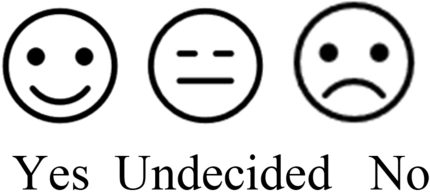
-
2.
When you read the power card, did you understand how the piano-playing girl/Roblox/Huggy Wuggy dealt with the problem (when the piano-playing girl/Roblox/Huggy Wuggy was not allowed to play, was pushed or was tickled)?
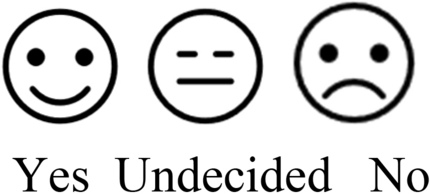
-
3.
Can you follow the same steps as the piano playing girl/Roblox/Huggy Wuggy when someone is not letting you in the game, pushing you or tickling you?
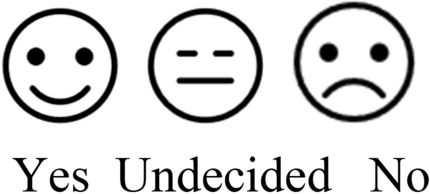
-
4.
Do you like reading the power card? Do the power cards help you remember what to do?
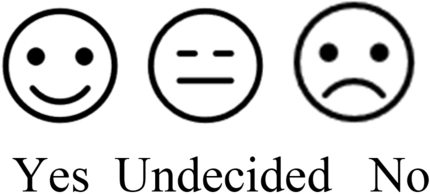
-
5.
Does it feel good to have a power card?
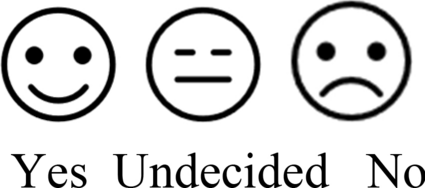
Rights and permissions
Springer Nature or its licensor (e.g. a society or other partner) holds exclusive rights to this article under a publishing agreement with the author(s) or other rightsholder(s); author self-archiving of the accepted manuscript version of this article is solely governed by the terms of such publishing agreement and applicable law.
About this article
Cite this article
Ulu Aydin, H., Cifci Tekinarslan, I. & Gulec Aslan, Y. The Power Card Strategy: Strength-Based Intervention Against Bullying for Children with Autism Spectrum Disorder. J Autism Dev Disord (2023). https://doi.org/10.1007/s10803-023-06161-w
Accepted:
Published:
DOI: https://doi.org/10.1007/s10803-023-06161-w








